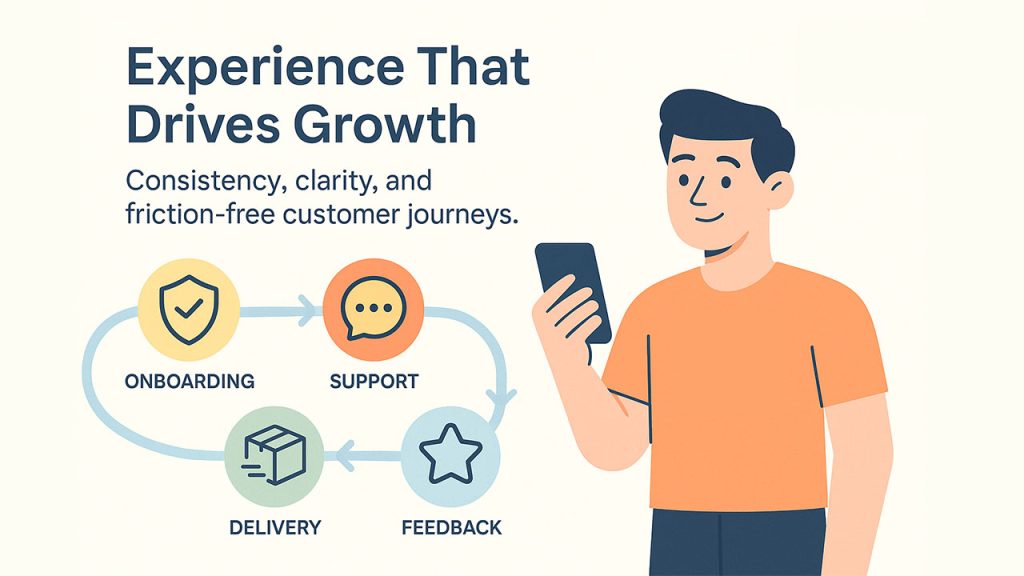Reaching the seven-figure mark isn’t an overnight event. It’s rarely a lucky moment, a viral opportunity, or a sudden leap. The majority of small businesses arrive at this stage with consistent revenue primarily from dependable and recurring activities. The top 5% distinguishes themselves not through complicated business plans, but through an enhanced level of discipline, clarity, and focus on their commitment to the fundamentals.
Before crossing over seven figures, these top performers have in place a well-developed system; they understand their business numbers; and continuously refine the methods of conducting daily operations to maximize revenue generation for the company. These business owners have placed a higher value on stability and long-term revenue generation than on quick returns. By mastering the essential steps of business development, the business owner's approach to business decision-making has changed to less reactive and more intentional.
They Build Operational Systems Early, Not Later
Many founders wait until “things get busy” to create processes. The top 5% do the opposite. They start building systems long before they feel necessary. It may seem early, but the payoff is huge.
They document how tasks get done. They create templates, checklists, workflow maps, and playbooks. Nothing is left to memory. The outcome is predictable execution, fewer mistakes, and better handoffs. As the business grows, the team doesn’t reinvent the wheel each time. They simply follow what works.
Small businesses that reach seven figures also automate simple tasks before hiring more people. They streamline follow-ups, scheduling, invoicing, lead tracking, and customer communication. When growing, companies can be put under a lot of operational stress that can negatively affect them. However, when they have the right foundation in place, scaling becomes a process—not a crisis.
They Invest Early in Digital Presence and Demand Generation
Many successful companies have a clear strategy for managing visibility long before they reach the seven figures mark. They understand that if consumers can't find a product, then they can't purchase it. A strong digital ecosystem becomes their silent salesperson—running 24/7.
They build a clean website that explains what they do in a straightforward way. They publish useful, simple, and consistent information that answers customer questions. Additionally, successful companies maintain a professional profile across various platforms and channels. They don't try to be everywhere to establish a presence on every potential channel; rather, they focus on those channels that fit their target audience and commit to them.
To maximize the benefits of their social media marketing, they also leverage content marketing to build credibility and increase organic visibility on search engines. Instead of pushing promotions nonstop, they offer insights, guidance, and relevant information. This approach attracts visitors naturally and positions the business as a credible source long before a sales conversation starts.
They Know Their Numbers Better Than Their Logo
Many small business owners obsess over branding, aesthetics, and identity long before understanding how money flows through their company. The businesses that scale past seven figures flip this order.
They watch their data carefully. They know their acquisition cost, lifetime value, margins, retention rate, and average revenue per client. They know what truly influences success and what doesn’t. They make decisions based upon data rather than emotion.
This clarity gives them the ability to quickly discontinue any unsuccessful initiatives and instead increase their investment in successful ones. They do not hold onto personal favorites; if a strategy or product is not performing as expected, they modify their approach. They assign resources according to results, rather than according to public or industry trends. This disciplined approach to the use of data creates sustainable growth over time.
They Prioritize Customer Experience at Every Stage

Every top-tier small business place customer service at the forefront of their entire organization from the time they first receive a sale until after they finish the transaction. They do not solely concentrate on making sales. They want to ensure that when customers leave the store, they have received excellent experience, and they make changes necessary to create positive experiences for their repeat customers. How the customer feels during onboarding, support, delivery, and feedback—every phase matters.
They refine touchpoints. They make communication clear. They remove friction from the buying process. Their customers know what to expect and consistently receive the same level of service. That reliability becomes a competitive advantage.
This group also collects feedback constantly. They look for patterns. They fix recurring issues quickly instead of patching them temporarily. The result is higher retention and stronger referrals. For most small companies, retention has more impact than marketing spends, and the top 5% treat it as a core growth driver.
They Develop a Clear Value Proposition and Stick with It
One of the biggest mistakes small businesses make is shifting their messages too often. They try to appeal to everyone and end up resonating with no one. The top 5% avoids making this mistake from the beginning.
Successful businesses are clear about the products or services they can sell and what they can do to meet the needs of their ideal customers. They have also identified the main issue or problem they solve for their customers.
Once they refine their messaging to a simple, understandable and consistent message for all of their platforms, they will not chase after each new product idea unless it fits into their long-term plan. Businesses that establish a clear identity foster a level of trust with customers, and clarity that sets the foundation for a predictable growth rate.
They Focus on Building a Reliable Team, Not Just Hiring People
As businesses grow, they realize they will need to hire more staff. However, the best small businesses do not rush into hiring. They hire strategically. Strategic hiring involves defining roles clearly. Small businesses should only hire individuals who meet their expectations regarding skills and company culture.
A culture of ownership is created within the organization. Employees understand what success looks like, what they are required to do to achieve success, and how their work contributes to the success of the business. The expectations of all employees are clear and transparent.
This leads to building a team that can work independently and make informed decisions. When every person contributes effectively, the business gains both stability and momentum. That consistency helps the organization move toward seven-figure revenue with limited setbacks.
They Streamline Sales with Clear Processes
The top 5% don’t rely on random opportunities or unpredictable outreach. They create a structured sales system that can be repeated with metrics; improved, measured, and allows for structured follow-ups, defined lead pipelines, and clear qualification steps to ensure that no leads fall through the cracks.
Their sales conversations follow a framework, not scripted, but rather a guide to create consistency in sales conversations. They ask the right questions, listen carefully, and focus on providing solutions—not pressure. By following a dependable process, they close more deals with less effort.
They also keep their pipeline full continuously, not just when revenue slows down. The structured approach helps small businesses avoid the boom-and-bust cycle that is often experienced.
They Prepare for Scaling Before They Need It
Instead of reacting to future growth, these businesses proactively anticipate it. They recognize that success brings challenges in the form of increased customers, communication, and complexity; therefore, they prepare accordingly.
As such, they develop their systems, tools, and workflows well in advance of their growth expectations. They work through several different scenarios and ensure that their infrastructure supports increased demand. Therefore, when growth arrives, it doesn't create an atmosphere of chaos, but rather, it flows easily into the business.
This proactive mindset helps avoid unnecessary setbacks. It allows them to maintain quality even during rapid expansion.
Conclusion
Ultimately, there are no secrets or shortcuts to creating a business that generates seven figures revenue. Rather, the success of these businesses is based on creating and sticking to the consistent habits of strategic planning and execution. Instead of employing a "trial and error" approach, they apply a systematic, thoughtful, and thorough process to everything they do with their business.
While every business grows at its own pace, the principles remain the same. The top 5% simply chooses to apply them early—and stick with them.








